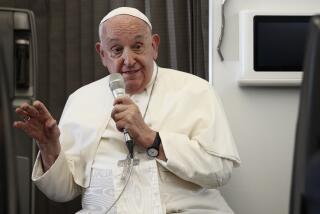Lofty Papal Thoughts and the Struggles With Real Life
The Pope speaks, and the struggling continues.
For the people in the largely Mexican-immigrant parish of Our Lady of Guadalupe Church in Santa Ana, no Pope’s words are taken lightly, for this is a parish that reveres not only the Pope but the Catholic Church, says Father Anthony Palos.
His is a working-class and low-income parish, where family heritages include large numbers of children. And yet, people realize the difficulty of maintaining large families today and are more aware of family planning.
Into this secular society of ambiguity steps the Pope, who wants to restore moral certainty to a world that isn’t quite ready for it. If he seems to be a man out of step with the times, is the problem with the man or the times?
That question is sure to surface again with the publishing of a new encyclical from Pope John Paul II, in which he restates his previous opposition to contraception, abortion and euthanasia. He also goes further than before in all but calling for the elimination of capital punishment.
“They struggle with that kind of doctrine (against family planning), because in real life it’s kind of difficult,” Father Palos says. “But they know it’s wrong and they do the best they can. They really accept the doctrine, but there is human weakness. Life is difficult. I have a lot of understanding for them. I won’t condemn them.”
The Pope’s pronouncements don’t make parishioners unhappy, Father Palos says, because they accept that what he says is true. “In theory, they know that’s best. In practice, people do their own thing. I believe that they always know that is wrong.”
Titled “The Gospel of Life,” the encyclical argues that democratic societies that legalize abortion and euthanasia, often referred to as “mercy killings,” more resemble totalitarian states. “When a parliamentary or social majority decrees that it is legal . . . to kill unborn human life, is it not really making a tyrannical decision with regard to the weakest and most defenseless human beings?” the Pope writes.
As for euthanasia, he depicts it as a “grave violation of the law of God, since it is the deliberate and morally unacceptable killing of a human person.”
For the first time in an encyclical, the Pope also declared the church’s near total opposition to the death penalty. The only time capital punishment could possibly be justified, the Pope said, was when society could not otherwise defend itself. But, the Pope stressed, “such cases are very rare, if not practically nonexistent.”
Father Frank Moran’s Our Lady of Fatima parish in San Clemente is mostly white and middle class. It won’t be surprised by the Pope’s encyclical, he says, “and like all human beings they’re going to struggle with it. . . . I think they will certainly listen to his teaching and pray and think about it and hopefully go along with his teaching. There will be those who will not, of course, but overall there is great respect for John Paul II.”
Polls have shown that many Catholics disobey the Pope’s admonitions against birth control or abortion. “You get those reactions,” Father Moran says, “but one thing about the church, it has to stick to its teachings. I think there’s a lot of admiration for (the Pope) in that he stands for what is truth and what has been the teaching of the church. There’s no wavering on that.”
Because theology and politics are so entwined these days, it will be interesting to watch the reactions of anti-abortionists to the Pope’s denunciation of capital punishment. In contemporary politics, of course, there is much overlap between anti-abortionists and supporters of the death penalty.
With his prescribed limits on capital punishment, the Pope seems to be eroding the moral high ground from under those who pontificate against abortion while supporting capital punishment. In the Pope’s absolutist view of human morality, you can’t have it both ways.
In a world that sanctions abortion, lethal injections, mercy killings, the pill and in vitro fertilization, is the Pope still relevant? Will his encyclical affect lives?
To the parishioners in Father Palos’ and Father Moran’s churches, the answer is still, yes. “The church has a cross as well as a crown,” Father Moran says. “Carrying the cross, it’s part of being a good Christian, even though it’s difficult.”
Dana Parsons’ column appears Wednesday, Friday and Sunday. Readers may reach Parsons by writing to him at The Times Orange County Edition, 1375 Sunflower Ave., Costa Mesa, CA 92626, or calling (714) 966-7821.
More to Read
Sign up for Essential California
The most important California stories and recommendations in your inbox every morning.
You may occasionally receive promotional content from the Los Angeles Times.










![[20060326 (LA/A20) -- STATING THE CASE: Marchers organized by unions, religious organizations and immigrants rights groups carry signs and chant in downtown L.A. "People are really upset that all the work they do, everything that they give to this nation, is ignored," said Angelica Salas of the Coalition of Humane Immigrant Rights. -- PHOTOGRAPHER: Photographs by Gina Ferazzi The Los Angeles Times] *** [Ferazzi, Gina -- - 109170.ME.0325.rights.12.GMF- Gina Ferazzi/Los Angeles Times - Thousands of protesters march to city hall in downtown Los Angeles Saturday, March 25, 2006. They are protesting against House-passed HR 4437, an anti-immigration bill that opponents say will criminalize millions of immigrant families and anyone who comes into contact with them.]](https://ca-times.brightspotcdn.com/dims4/default/34f403d/2147483647/strip/true/crop/1983x1322+109+0/resize/840x560!/quality/75/?url=https%3A%2F%2Fcalifornia-times-brightspot.s3.amazonaws.com%2Fzbk%2Fdamlat_images%2FLA%2FLA_PHOTO_ARCHIVE%2FSDOCS%2854%29%2Fkx3lslnc.JPG)